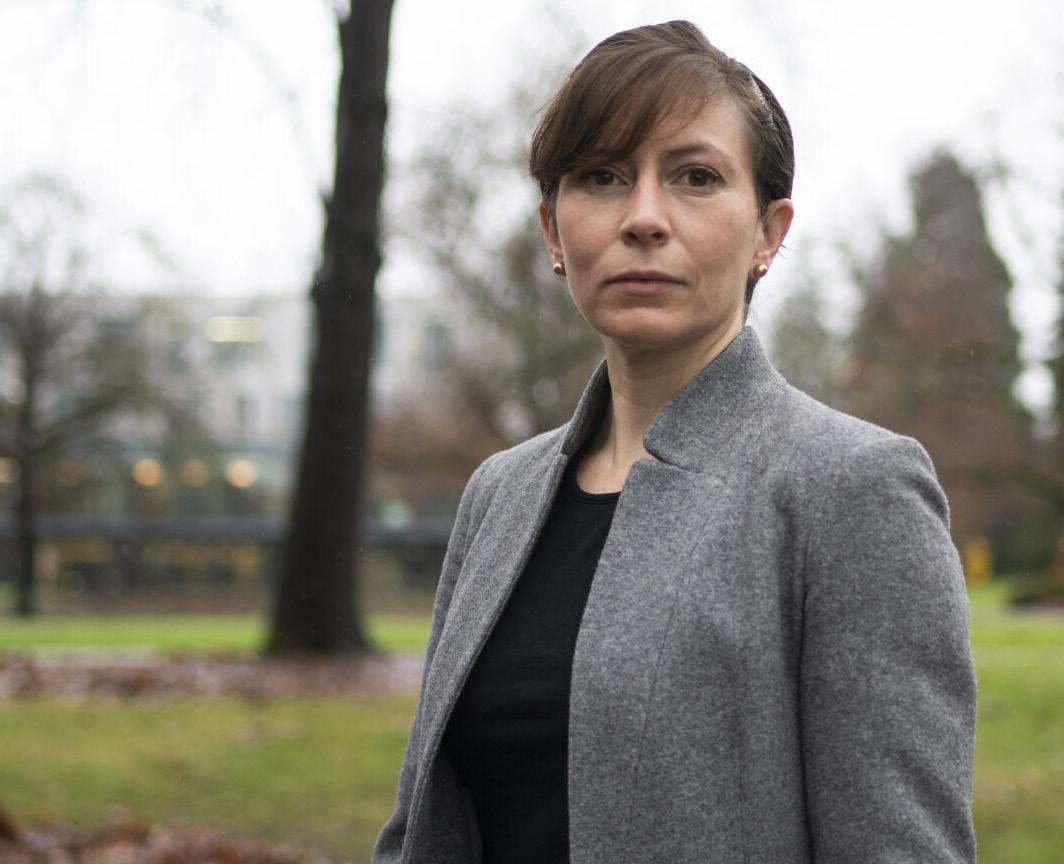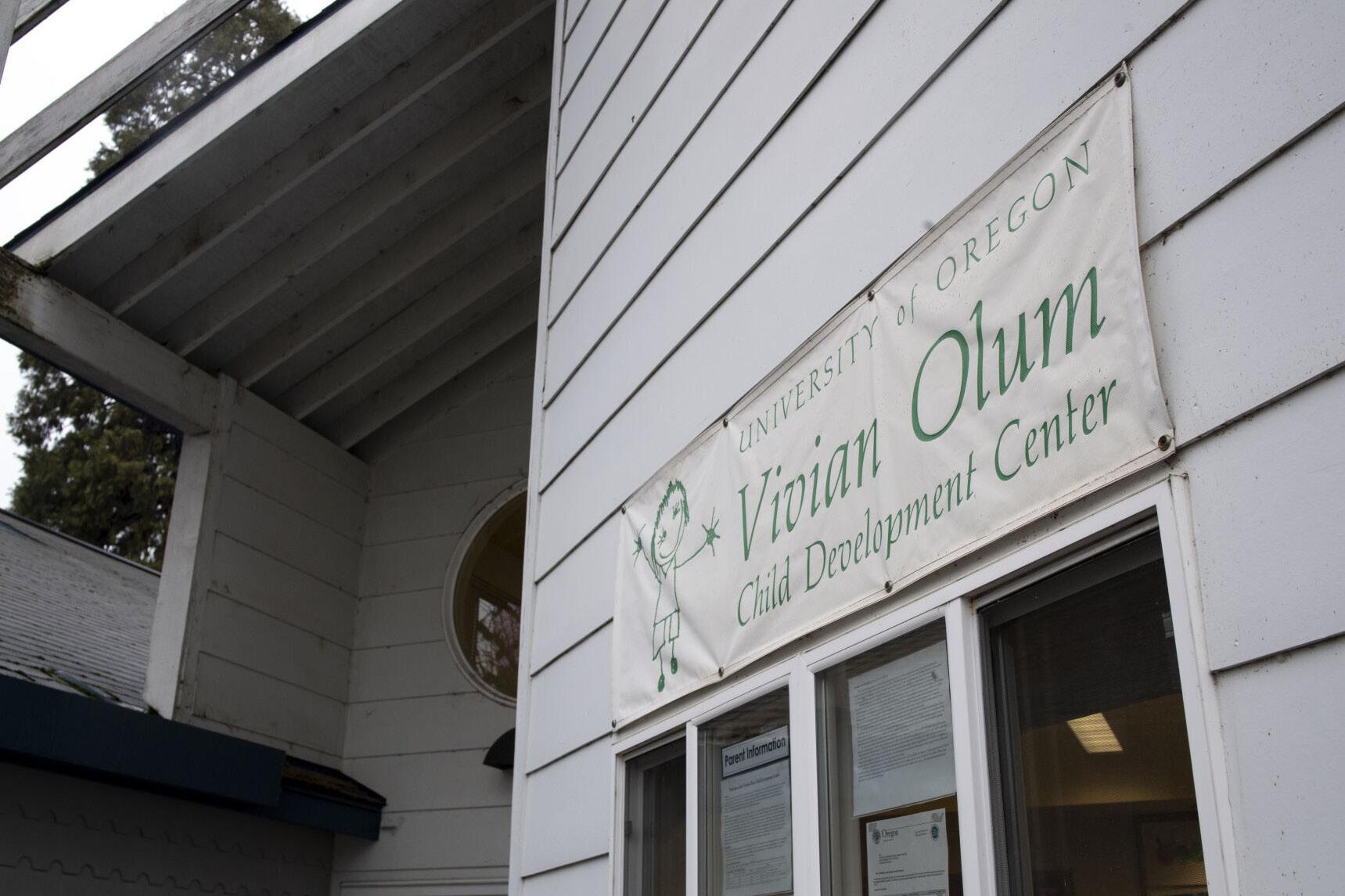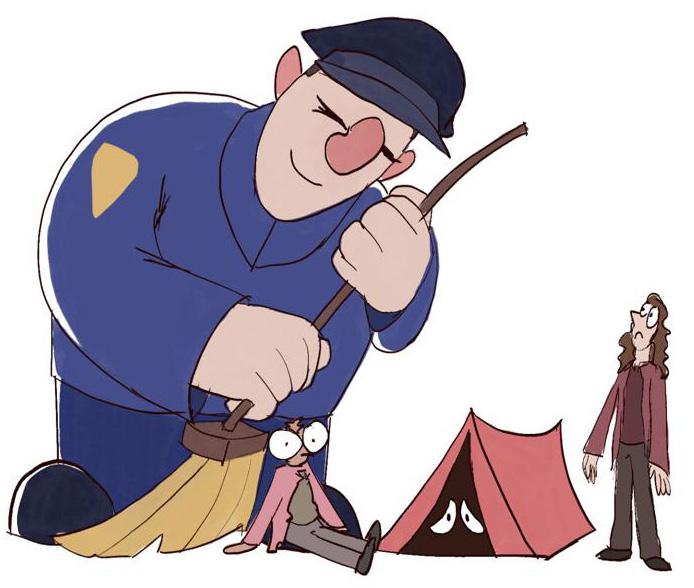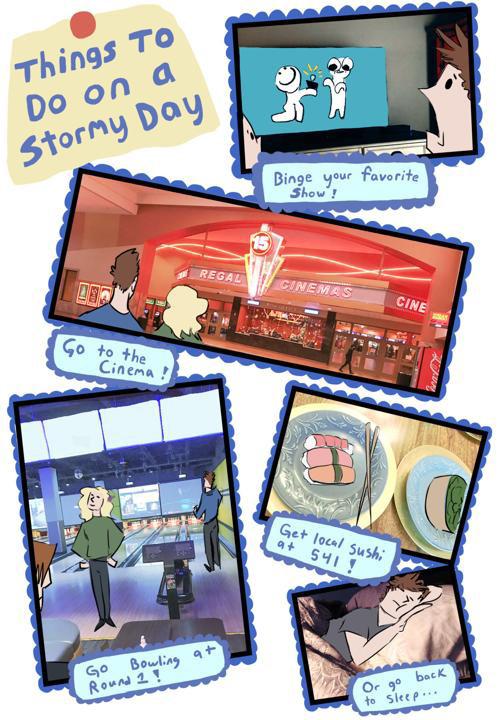
10 minute read
CHILDCARE STAFF SHORTAGE
The Vivian Olum Child Development Center works to provide childcare for faculty and staff at the University of Oregon in Eugene, as seen on Jan. 5, 2022. (Isaac Wasserman/Emerald)
UO CARE FACILITIES STILL LIMITED AFTER COVID-19
Closures and operational changes due to COVID-19 have had lasting effects on UO’s child care centers and those who need them.
Maria Escallón, an assistant professor of anthropology, came to the University of Oregon in 2016 while pregnant with her daughter. She made use of the Vivian Olum Child Development Center until its closure in March of 2020 due to COVID-19.
Escallón and her husband, an assistant professor of landscape architecture and environmental studies at UO, spent the next 18 months homeschooling their daughter, splitting time between teaching and research responsibilities and care responsibilities.
While UO’s care facilities are slowly rebuilding their capacity to accommodate pre-pandemic volumes of children safely, they face struggles with hiring and retention, as well as paying attention to the mental and emotional health of both staff and those they care for, Rachel Jefferson, director of the Co-Op Family Center, said. Meanwhile, UO community members who spend more time giving care face career setbacks with little support, Escallón said.
Jefferson said the Co-Op was closed from August to November of 2020.
“We did a soft opening, so we had less hours, less staff, less kids, less classrooms at the beginning, and we've slowly been growing ourselves back,” she said.
Aside from the school-age aftercare program returning next term, all six programs are running with limited hours and lower enrollment. While the Co-Op can normally accommodate up to 85 children in a day, it currently serves between 50 and 60, Jefferson said.
Escallón said finding care in Eugene is always difficult, and COVID-19 made it even harder. She said she is just hearing back from care options in Eugene she contacted when she was pregnant five years ago.
Caregivers have a lot more to weigh when it comes to care facilities due to COVID-19. She said she held off on re-enrolling her daughter at Olum for several months due to safety concerns.
Jefferson, also concerned for safety, said the Co-Op can only accommodate as many children as staff can safely and appropriately support, and the Co-Op continues to struggle with staffing and hiring.
“For a full year there were only two admin doing the work of four in our office and now we have three during the work of four,” Jefferson said. “I'm personally the new director but I'm also still being the pedagogy coordinator. We have absolutely no access to substitute teachers.”
The lack of substitute teachers and appropriate staffing can be an issue because taking time off for illness is essential for everyone’s safety, Jefferson said.
“A shortage of qualified caregivers continues to pose unique challenges for the university’s child care centers,” UO spokesperson Kay Jarvis said in an email. “The university continues to seek qualified caregivers and we are speaking with our families and staff, in search of interim solutions in an effort to continue providing this vital service to our students and employees.”
Jefferson said the Co-Op needs two more lead teachers and two more teaching assistants to get to a point where increasing enrollment would be feasible.
Aside from the numbers, many staff members are tired.
“We're seeing a lot of challenges around children that are having a hard time and presenting that through challenging behaviors in the classroom, which then can be overwhelming for the staff,” Jefferson said. “They need more support and more training, which we're trying our best to do.”
Supporting staff through hiring and training comes at a cost, though, and the Co-Op has “not been operating in the black many months out of the year,” Jefferson said, and is not in the financial position to hire positions with benefits. Plus, the wage the center could offer is not competitive for the skill level of the job.
The annual salary of an early childhood assistant at Olum is around $28,600, according to the UO Office of Institutional Research.
“UO has expanded its efforts to retain and recruit full-time, part-time and student positions in the midst of staffing shortages being experienced across the country,” Jarvis said in an email. “These efforts include offering bonuses for qualified applicant referrals, retention bonuses, and pay increases.”
Through Early Learning Division grants, the Co-Op has begun to offer bonuses to staff. The most recent ELD grant applied to bonuses lasts until April, and
BY ABBY SOURWINE
the team is still weighing whether an overall raise would be better than a bonus, even though they’re not sure they could fund higher salaries after April.
“We're looking to try to support people in individualized ways as well as kind of across the board bonuses,” Jefferson said.
Last summer, Escallón started a caregiving campaign to advocate for caregivers at UO — whether they work in care facilities or not — to be considered as a distinct group with specific needs who were impacted in distinct ways by COVID-19.
She said the lack of support for caregivers is a social issue, as caregivers are often women of color, and caregivers will struggle to progress their careers at the university without support. Often, when new responsibilities are added to professors, their research suffers because there is less accountability for research than for teaching or leading departments.
Already in the field, “women and caregivers are not submitting papers and producing reports and writing as much as men, for instance,” she said. “They're diminishing their capacity or their ability to submit new grants and fellowships.”
That’s what happened to Escallón. She is on the tenure track and had to extend the clock for maternity leave as well as COVID-19.
“You lose money in the sense that you're not getting a raise, and then that costs you in retirement forever,” she said.
In the study, Escallón chose 10 universities across the United States that have made at least one big policy change due to COVID-19. She said she found that most of them decided to do a one-year extension of the tenure clock and a few granted COVID-19 funds, some more successfully than others. She found none of the large policy changes addressed the structural inequities caregivers face. They are one-off changes to respond to a moment of crisis.
“At some point, most people in life are caregivers for somebody,” she said. “It could be a parent, it could be a loved one, could be a neighbor. It doesn't have to be biological. I think it's such a large issue that is missing from the discourse in the narrative of inclusion and diversity in the university so far.”

“Parenting should not be a liability for success and a career,” said assistant professor of anthropology at the University of Oregon and mother Maria Escallón in Eugene, on Jan. 5, 2021. (Isaac Wasserman/Emerald)
The Vivian Olum Child Development Center works to provide childcare for faculty and staff at the University of Oregon in Eugene, as seen on Jan. 5, 2022. (Isaac Wasserman/Emerald)


(Grace Turchetto/Emerald)
Call it a coping mechanism — or a bad habit — but terrible news inevitably leads me to Twitter. It’s an endless cycle; I get a notification from a news app, scroll through the story and immediately head to Twitter to see what others are saying. Seeing others vent about the chaos unfolding around us is simultaneously anxiety inducing and therapeutic. One feels less alone when others panic with them.
The problem is that the cycle invites inaction. With so many issues arising every day, the last part of our process has become scrolling through media to purge internal fears onto a public forum for comfort, only to be blindsided by the next crisis immediately after.
Exposure to trauma across the nation only exacerbates the trend. Take the killer Kyle Rittenhouse for example: When the news broke that the court found him not guilty of murdering the two anti-racist protesters he shot and killed in Kenosha, Wisconsin, I and those around me felt disempowered. Events far from Oregon felt as though they were stripping me of my agency. This is the crux of our inaction problem; inundation of national crises blinds us from taking action on individual tasks, even those right in front of us.
This phenomenon feeds perfectly into a national liberal agenda. The current moderate Democratic agenda works through an institutional approach that is designed to inch the status quo leftwards. Tangible action is reduced to feeble campaigns calling for people to vote in the distant future. Improvement has become a long term consideration, maintaining the illusion of progress while being careful to not upset the general national hegemony. This comes in the shape of trickle-down progressivism, where focus on national improvement is promised to yield local benefits. Our media reflects this; a majority of news covers mainly national-scale politics.
The crisis cycle adds to this. With constant exposure to mainly national politics, the sheer amount of catastrophe becomes a breeding ground for passivity. Ending each piece of news by simply scrolling through media is a liberal dream. Disillusioned consumption replaces tangible action. With our focus on the national scale, the liberal agenda can assert dominance, ensuring meaningful change remains only a promise.
There is, though, a path to breaking the cycle: local work. My dejection following the horrifying Rittenhouse verdict and powerlessness surrounding national problems distracted me from the fact that there are problems in my own community that require help. Here in Eugene, houselessness remains an issue that is talked about but not acted on. We can start here. Locally, there are many ways to help the houseless. Volunteering with Eugene Mission, donating food and supplies to Food for Lane County or even simple monetary donations are necessary places to start. Lesser known, but extremely effective, forms of aid include the Neighborhood Anarchist Collective and Food Not Bombs, both of which provide zero-barrier mutual aid to unhoused peoples and those in need.
When crisis strikes, it’s inevitable that we will panic. It’s essential to remember that feeling bad or having sympathy by recognizing a problem does nothing. Even if it feels better, dread cannot overcome the passivity institutionalized by a national-focused liberal agenda. With every catastrophe, the news cycle that ends with personal panic only leads to more disasters gone unaddressed. We have a responsibility to end the crisis cycle that bolsters a status quo agenda. I do as well. Writing and consuming media cannot be an end in itself. It must be a catalyst.
OPINION START LOCAL
In tumultuous periods of national politics, it’s easy to feel disengaged and powerless. But work can be done — locally.
BY PARSA AGHEL • TWITTER @PARSALONA1
Parsa Aghel is an editor and columnist at the Emerald’s opinion desk. He brings a critical lens to power structures and is an advocate for human rights. Follow his Twitter @parsalona1
HOT OR NOT
MAKING RESOLUTIONS
The time of year to set goals you’ll soon give up on is here! But really, take this new-found energy and make some changes — hit the gym, dye your hair, go to therapy… The possibilities are endless! - Cale Crueger
CROCHETING
This winter learn to crochet and you can stay cozy with homemade hats, scarves, gloves and sweaters. So turn on a podcast, curl up with a blanket and crochet away. It’s easier than knitting. - Shelton Bowman
FREE-SKATE AT THE RINK
There’s somehow always some child that’s way better than me, and that’s annoying. They can’t do division yet, but they dust me every lap while I look like Bambi on ice. They’re way cooler than me, and it’s embarrassing. - Braydon Iverson
HOUSEPLANTS IN DORM ROOMS
Adding greenery to the otherwise plain dorm seems like a great idea until the window sill is clogged by dying vines and you have to dodge stray leaves whenever you work at your desk. The splash of color is worth it, though. - Emma J Nelson
FLORIDA TIGER KILLING
Law enforcement killed a tiger after it attacked a man who tried to enter its enclosure. Killing already-captive animals for acting on their instincts places the blame on the animal and not the reckless actions of people. - Caitlin Tapia
THE NEW YEAR
Earth has completed another arbitrary revolution, and folks I’m sorry to report, it still feels the same. We all have the same dietary habits and character flaws, and probably have not felt a good emotion since circa 2019. - Porter Wheeler



